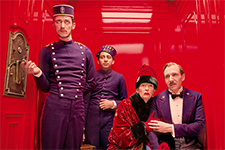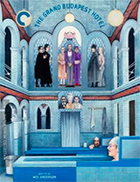The Grand Budapest Hotel
|  Given his love of quirky, outsized production design and amusingly fictionalized worlds, it is no surprise that the title of nearly half of Wes Anderson’s nine feature films refer directly to the location where the action takes place: Rushmore (1998), The Darjeeling Limited (2007), Isle of Dogs (2018), and The Grand Budapest Hotel, which in terms of scope and scale, is arguably the grandest of them all. While in Moonrise Kingdom (2012) he conjured up a fictional East Coast island, here he creates an entire fictional country, the so-called Republic of Zubrowka, which is home to the grand hotel of the title. You get the feeling that Anderson devises his locations before the narratives that take place within them, and in his best films (particularly Rushmore, The Royal Tenenbaums, and Moonrise Kingdom), he comes up with characters and stories that feel like organic outgrowths of those locales, which are always a mix of the fantastical and the imminently recognizable. The Grand Budapest Hotel doesn’t quite reach to the level of those films, but we can be thankful that Anderson’s focus on oddball humor, audaciously eloquent dialogue, and cartoonish absurdity remains central and doesn’t get derailed by the overly forced attempts at familial pathos that have marred some of his other films. The Grand Budapest Hotel, which was inspired by the work of Austrian writer Stefan Zweig, is told as a story within a story within a story (each of which gets its own, period-appropriate aspect ratio). In the mid-1980s, an unnamed writer (Tom Wilkinson) tells us about his experience as a young man (Jude Law) in 1968 having dinner with the Grand Budapest’s mysterious owner, an older, bearded gentleman named Mr. Moustafa (F. Murray Abraham). The majority of the film then unspools Moustafa’s story, as he came to work at the hotel in the early 1930s as an orphaned teenage lobby boy named Zero (Tony Revolori) under the tutelage of the hotel’s concierge, M. Gustave (Ralph Fiennes), who takes his work, which includes “taking care of” the hotel’s aging female clientele, with the utmost seriousness. Fiennes is the film’s true star, and he gives an elaborate comic performance centered around his character’s robust professionalism and breakneck verbal eloquence. Having seen him play so many heavy characters in recent years (everything from Shakespeare’s tragic hero in Coriolanus to He Who Shall Not Be Named in the Harry Potter series), it is refreshing to see him stretch his deadpan comedic chops, especially when he’s this good, cracking off his curt lines with oh-so-British verbose authority and barely breaking a sweat even when facing down storm troopers or tunneling out of prison next to a tattooed Harvey Keitel. The plot kicks into high gear with the death of Madame D (Tilda Swinton), one of M. Gustave’s elderly female companions who recently changed her will to leave everything to him, including a priceless painting. This does not sit well with Madame D’s constantly fuming son Dmitri (Adrien Brody), who enlists the services of a bulldog assassin (Willem Dafoe) to do his dirty work. Meanwhile, Zubrowka is being thrown into chaos as an impending war (a clear stand-in for World War II) commences and an invading army (a clear stand-in for the Nazis) takes over the country and makes the hotel its base of operations. Anderson, working from a story he concocted with Hugo Guinness, who previously worked with Anderson in different capacities on The Royal Tenenbaums (2001) and Fantastic Mr. Fox (2009), fills the margins of the story with his usual assortment of oddball supporting characters, including Saoirse Ronan as Agatha, a pastry chef and potential love interest for Zero, and Jeff Goldblum as Deputy Kovacs, Madame D’s lawyer. Anderson regulars are all over the place, as well: Bill Murray and Owen Wilson show up as concierges at other hotels, Jason Schwartzman does a nice turn as the Grand Budapest’s languid concierge in 1968, and Edward Norton does a riff similar to his character in Moonrise Kingdom as a stern-but-sensitive military commander. While Fiennes is the star, he is regularly upstaged by the film’s elaborate production design, which ranges from the cavernous hotel set (built inside an empty art nouveau department store in Gorlitz, Germany), which is made to look dramatically different from the ’30s to the ’60s (the orange palette and modernist furniture is made to stand in for the hotel’s decline from its heyday of candy-colored Old World decadence), to patently fake-looking miniatures that depict the unicular railway car that climbs up the steep mountain to the hotel’s entry. We have certainly come to expect this from any film bearing Wes Anderson’s name, and when his films work, it is because he finds ways to interweave the patent fakery of his hermetically sealed worlds with the mixture of comedy and drama taking place within them. Outside of The Royal Tenenbaums, he has done better when he leans more toward the comic than the dramatic, and The Grand Budapest Hotel is no exception. Its humor is both verbal and visual, and Anderson builds in some fantastic visual puns and unexpected punchlines, at least one of which involves the shock of watching a character suddenly lose many of his fingers. As with all Wes Anderson films, the one thing we can always expect is the unexpected.
Copyright © 2020 James Kendrick Thoughts? E-mail James Kendrick All images copyright © The Criterion Collection | |||||||||||||||||||||||||||||||
Overall Rating: 


 (3.5)
(3.5)


